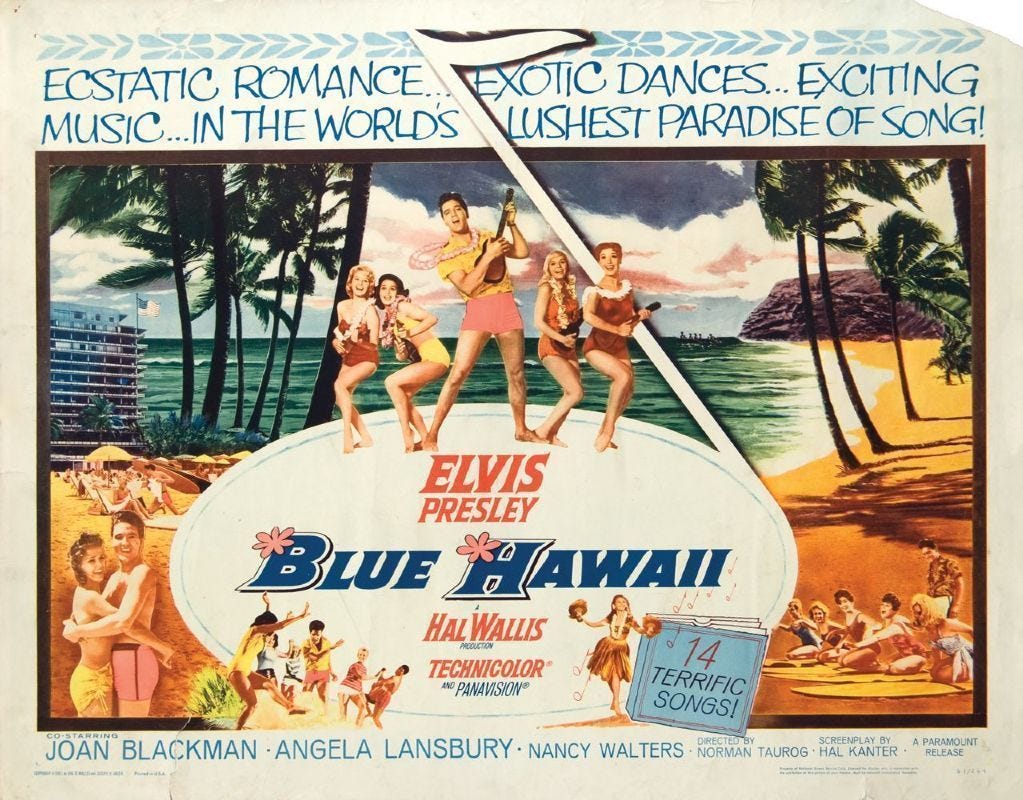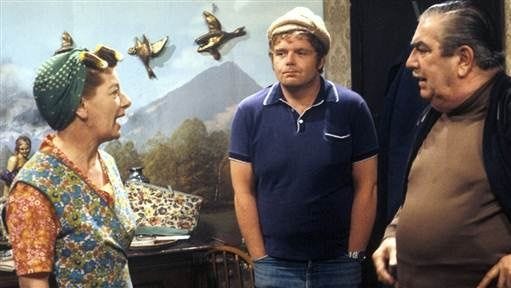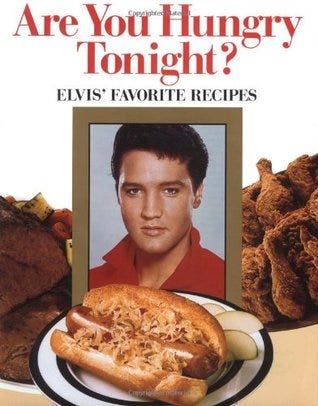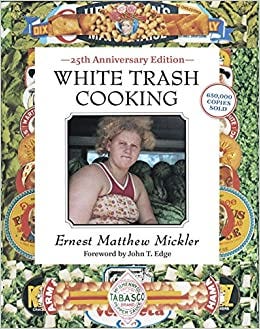Introducing: Kitsch Corner #1 or why a Trump cookbook cannot be kitsch
Welcome to the first in a series of newsletters about niche and kitsch food writing. Eventually, Kitsch Corner will be subscriber-only but for now, I am keeping it free-to-read.
“Own it, and it can’t be used to shame you”, goes the quote. It’s something I had to embrace when I misquoted Shakespeare one day. “A goat by any other name would smell as sweet,” I said, much to the amusement of my family, an error which led to months of embarrassment for this former student of English literature. Because of this, I have been the recipient of multiple gifts of plastic goats, all of whom gather in herds along the tops of picture frames and which, to your eyes, might look kitsch. But what do we mean when we describe something in this way?
This loanword from the German has no definitive meaning although there are common themes: a low-rent, trashy populism abstracted from most forms of cultural mediation; an appeal to the more superficial and performative aspects of human emotion- the “perfected self-consciousness” that Clement Greenberg talks of and a form of performance art. To be kitsch is to collude with others of like mind. It is tribal, a ‘cultural mother tongue’, and like everything else, kitsch is culturally loaded.
Many of the explorations of kitsch's meaning ignore one important element: a warm disposition towards whatever or whoever is depicted as kitsch must be invoked in us— its beholders— along with feelings of nostalgia, fondness, and, perhaps, a soupçon of sadness. This need not be an inauthentic ‘overly emotional’ response, either. However, discomfort about the validity of sentimentality as an evocation may have come to define what is considered to be kitsch by many art critics.
Trump’s ‘banquet’ of fast food for visiting sports teams was not kitsch, but it might have been seen in this way had Liberace or Elvis catered it. Nigella’s chapter on ‘Trashy Foods’ (which features Elvis’s famous peanut butter and banana sandwich is most certainly kitsch. Did Elvis intend for one of his favourite sandwiches to be viewed in this manner when he first asked the Graceland cook to make one? Can something be truly kitsch if that was not its original intention? Trump clearly believes the gilded tyranny of his interior decor shows good taste. Hilda Ogden also believed her flying ducks and ‘muriel’ were tasteful, but for a while, many young-bloods-about-town adopted this ‘style’ of decor. What is the difference? When is vulgar no longer vulgar? I doubt Hilda saw her flying ducks in this way. I bet Saddam didn’t see his gold toilet as vulgar either.
Saddam’s murals of muscular men and semi-naked women and gold-plated loo brushes in a palace built from rose-coloured stone surrounded by crowds of poor, hungry people cannot be viewed as anything other than the worst kind of ‘dictator chic. So do appalling acts hold less appeal if they happened relatively recently? I don't know about that. Many of us feel repulsed by capital punishment, but a book about the last meals of convicts on Death Row holds a certain kitsch appeal for some readers. Death Row continues to exist, and in one book, we are reminded that the granting of last meal orders is conditional anyway; prisons state they may not be able to meet an inmate’s last request. Brutal. On Twitter, I've seen blue tickers sing the praises of cushions imprinted with the image of Rosemary West. Her crimes weren’t that long ago. There's even a Hannibal Lector cookbook. So how do we go from revulsion to the comfortable purchase of a Saddam mug for our kitchen shelf? I suspect there are cultural forces at play.
The intentions behind Trump’s aesthetic is in opposition to kitsch’s performative and participatory element despite some superficial similarities. Elvis retained a keen sense of what his fans expected of him; they wanted largesse, so he gave it to them, but he craved legitimacy too. Trump is not dissimilar. Graceland was Elvis’s vision of what wealth, leisure, and comfort should look like, as is Trump's own Florida pad, Mar A Largo. But Elvis was also a man whose identity as a performer involved a certain amount of playfulness. Trump cannot take himself anything other than seriously, and this will always be inverse proportion to how everyone else sees him. I can't see a space for the kitsch to take root.
Unlike Trump, we don't want to see Elvis’s appetite and vision of interior design as a mere product of his material aspirations. We need Elvis to be in on the joke, but we don't want Trump to be because that might soften his edges. Graceland’s jungle room. Its multi-screened TV room and Elvis’s willingness to use a gun to blast a screen to smithereens whenever a show displeased him. The private jets sent to Denver to buy ‘Fools Gold’ sandwiches. The teetering piles of mashed potato and ice cream bought to him as he sat up in bed. The 24-hour personal cook. The punning cookbooks titled ‘Are You Hungry Tonight?’ All have the potential to trouble us, but we let this go. Elvis was a super-consumer and an example of what happens when the American Dream goes wrong, but that is a thought so troubling for the Boomer generation they have had to repackage it. In doing so, the truth of Elvis’s aesthetic and psychological life is warped. His eating disorder, attachment issues, and mental ill-health are not kitsch, yet how they manifested themselves have been reframed as such.
Trump is also a super consumer, and we're happy to have his excesses defined as such, but there's nothing American Dreamlike (which sounds like a kitsch concept in itself) about them. Kitsch should not trigger feelings of dissonance, and it avoids this by exerting a neutering force upon its more difficult subjects. But we're not yet in a position to want to neuter Trump’s flaws in the way that we did Elvis’s. There's nothing playful or arch about Trump’s tastes or habits. They were always bad; there is no palatable start point, but we want to like Elvis and feel sympathy for him despite some of the more unpleasant aspects of his behaviour. Defining something as kitsch can be an act of camouflage or obfuscation.
So, the fried peanut butter and banana sandwiches that likely contributed to Elvis’s death have become iconic, or ‘ironic-Haute as the food media seek to reinterpret them in ever-more lavish and kitsch ways. But Trump's KFC - fuelled flights on Airforce One have not. We are not charmed by the high - low aesthetic of a president chomping his way through a bargain bucket on the most exclusive private jet in the world.
Yet we happily drink from a frosted pint glass embossed with an image of Elvis at his most lithe and excitedly coo over Graceland-branded travel flasks even though Elvis rarely travelled beyond his bedroom towards the end of his life. We lap up kitschy stories of Elvis sending his private jet to collect massive bacon-filled loaves of bread and search the Internet for recipes telling us how we can make them. Our appreciation does not make us feel superior, only wistful in the light of what we know what was to come for Elvis. And if there are any lessons to be learned, they are about the ultimately unsatisfactory, short-term pleasure of acquisition after a life of deprivation, or, as Karal Ann Marling wrote in her 1994 take on the Elvis myth, Graceland: Going Home with Elvis: “about the pleasure of getting things you’d always wanted and how the feeling fizzled out in emptiness ... The trip up the (Graceland) driveway is all about a little hard-won wisdom.” Must a true appreciation of what constitutes kitsch always have to be post-hoc?
Many of the food-related writings and media I plan to write about in Kitsch Corner have been framed in a fluffy way or their intentions misinterpreted. Their creators may have wanted to amuse and entertain, or in the case of cookbooks like Ernest Mickler’s ‘White Trash Cooking’, to document a way of life resulting in a book that has been reframed as kitsch when its intentions were anything but. That’s not to say that they don’t entertain; Mickler’s book IS spirited and a huge pleasure to read, and it possesses the knowingness which underpins kitsch. He knew how his book would be received, and the people whose honest-to-god family recipes are documented within its pages are in on the joke. But I still think White Trash Cooking was not intended to be received as kitsch, although a quick search will show that a healthy amount of ‘top ten kitsch cookbook’ lists include it. And I think this even though in his famous essay Avant-Garde and Kitsch, Clement Greenberg wrote that“the precondition for kitsch, a condition without which kitsch would be impossible, is the availability close at hand of a fully matured cultural tradition, whose discoveries, acquisitions, and perfected self-consciousness kitsch can take advantage of for its own ends”, something that many people will say applies to Mickler’s work.
Mickler wrote a book that contains not one shred of condescension or loftiness, but outsiders did not understand this. Back in 1986, The New Yorker refused to publish an ad for White Trash Cooking because it did not grasp that its very existence was an invocation of “own it and it can’t be used to shame you.” The book itself was almost universally positively received as an example of cultural reclamation.
But Mickler’s cookbook— like all cookbooks about traditions that may be unfamiliar— might also be seen in the context of ‘deculturation’ where a group of people is deprived of part or all of its identity, usually through the forces of colonialism -but not always. In the case of White Trash Cooking, we are talking about white southern culture, and Mickler did not intend readers to feel superior to the book’s subjects. Whether white southerners are justified in feeling their culture needs ‘reclaiming’ is another debate entirely. It may well be that our desire to frame this book as ‘kitsch’ is a dissonant reaction to a rather uncomfortable conversation about who gets to direct a narrative. Certainly, there are conversations about why white Americans feel ‘uncultured’ and our own uncomfortable relationship with books like White Trash Cooking.
To define something as kitsch can be an act of deculturation. Take the huge popularity of ‘Tiki’, whose aesthetic grew well beyond beach and pool front Tiki bars, to straw-topped car showrooms, hotels, garden tools, kitchenalia, and Amway soaps in the shape of Tiki. Americans were looking to escape from the dreariness of the Depression and the Second World War, so nobody cared if the Pacific Islanders minded seeing their gods and creation stories emblazoned on mugs, sippy cups, bumper stickers, and their ancestral homes depicted as mere places of escape, fuelled by Elvis films set in Hawaii and returning GIs who had been stationed in the South Pacific. Kitsch is nostalgia in neat packaging, the equivalent of wartime V mail where military sensors redacted soldier’s words telling of the grit and mess of war. I am guilty too. I own too many ‘Tiki’-themed cookbooks, an act which Professor Hokulani Aikau describes as a ‘caricature’ based on power and a reminder of who is in control. “Turn it into fun and play, all for the kitschy fake Hawaiian [stuff]. It reduces a very complex society down to a few key symbols,” she told the LA Times. (I recommend reading Rachel Laudan’s ‘The Food of Paradise’ for a comprehensive history of Hawaii’s culinary heritage.)
This doesn’t mean to say that ‘Kitsch Corner’ won’t also be a place of escape, sometimes-superficiality, and fun. It will, but it is important to be mindful too. We can reexamine our relationship with old favourites in a more contextualized way and still feel exhilarated that books like ‘Mosh Potatoes’ and an entire heavy metal cooking genre exist in this world.
If you don’t want to subscribe (which I understand), I also have a Ko-Fi page where you can make a one-off donation.








Divine!! I knew Ernie Mickler way back when. Well before the book. I am pretty sure another tag for this book could be camp. Ernie was a practitioner of gimlet-eyed camp, all while seeming personally luscious. And I think he was exploring the culinary aspect of "Florida crackers" rather than the whole South. One does not forget the pie so good that "it makes you want to lay down on the floor and scream.
Brilliant!